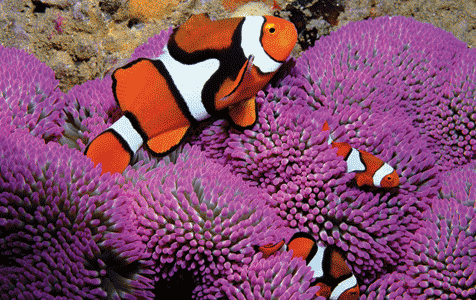Losing Nemo
From Microcosm Aquarium Explorer
Percula Clownfish: future could be threatened by acidifying oceans. Scott W. Michael
When Nemo, the cartoon clownfish, leaves the safety of his trusted anemone, his friends and his senses help him find his way home again. But what if something interferes with Nemo’s sensing ability, and he can’t find his way back, ever? New research points to a scenario in which this is both possible and probable.
Much current research is warning of the potential dissolution of calcium carbonate skeletons, which will affect coral reefs and mollusks as ocean acidification increases. At least 30 percent of manmade carbon dioxide (CO2) emissions have been absorbed by the world’s oceans, causing a decrease of 0.1 units in average ocean pH (presently ~8.1) since the beginning of the eighteenth century. Estimates project an additional 0.3-unit drop in this century—to a pH of 7.8. Shallow-water areas tend to have higher pH readings, and many coral reefs have been measured at 8.4; most reef-aquarium keepers aim for a pH range of 8.2–8.5 for optimal calcification by corals, clams, and other organisms.
Experts expect ocean acidification to increase shell erosion, impair the ability of organisms to regenerate new shells or skeletons, and restrict overall growth. Other new research is exploring the effects on non-calcified species, and the findings are disturbing. Lower pH interferes with physiological functions, such as the ability of corals to recognize beneficial algae necessary for survival, phytoplankton to build shells that protect them from protozoan predators, jumbo squids to off-load oxygen to muscle tissue, and clownfish larvae to distinguish olfactory clues that lead them from the open ocean to a reef anemone.
Acidic Confusion
Researchers at James Cook University found that larvae of Nemo-type Percula Clownfish (Amphiprion percula) reared in water with the pH levels expected late in this century (~7.8) were unable to recognize scent cues from fallen island vegetation, which normally lead them to coral reefs. Nor did they have the ability to distinguish parents from non-parents on the reef. Examination showed no physical differences between those clownfishes and others that were raised in normal seawater—only the chemosensory signals within the neurosensory system were affected. Larvae raised in water with a pH of 7.6 lost all ability to sense olfactory cues.
“We found the baby fish were strongly attracted to scents they normally avoided at the sort of levels of ocean acidity that could occur by 2100,” said lead author Dr. Philip Munday of the ARC Centre of Excellence for Coral Reef Studies, “and they no longer responded to scent cues at all when the acidity rose to the sorts of levels likely by the second half of that century if nothing is done to curb carbon emissions.”
These findings don’t bode well for Amphiprion larvae. If they can’t sense the location of suitable habitats, fewer larvae will settle. Inbreeding will result from smaller numbers and their inability to distinguish parents from non-parents. Ultimately, their genetic diversity will decrease, leaving them vulnerable to even small environmental changes. Losing Nemo doesn’t sound like the usual happy Hollywood ending. —Denise Nielsen Tackett
Excerpt from CORAL Magazine, Volume 6 #4, July/August 2009. To read more from this issue Coral Magazine.
References Munday, P.L., D.L. Dixson, J.M. Donelson, G.P. Jones, M.S. Pratchett, G.V. Devitsina, and K.B. Døving. 2009. Ocean acidification impairs olfactory discrimination and homing ability of a marine fish. PNAS 106 (6): 1848-1852. on the internet Coral Reef Studies (2009): Nemo “won’t be coming home.” http://www.coralcoe.org.au/news_stories/nonemo.html ScienceDaily (2008): Ocean acidification could have broad effects on marine ecosystems. http://www.sciencedaily.com/releases/2008/12/081217190334.htm —(2008): Ocean acidification from carbon dioxide emissions will cause physiological impairment to jumbo squid. http://www.sciencedaily.com/releases/2008/12/081215184321.htm —(2009): Ocean becoming more acidic, potentially threatening marine life. http://www.sciencedaily.com/releases/2009/02/090223091752.htm —(2009): Shellfish face an uncertain future in high carbon dioxide world. http://www.sciencedaily.com/releases/2009/05/090526202807.htm









